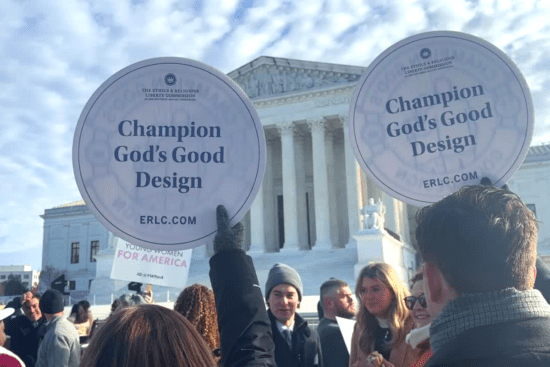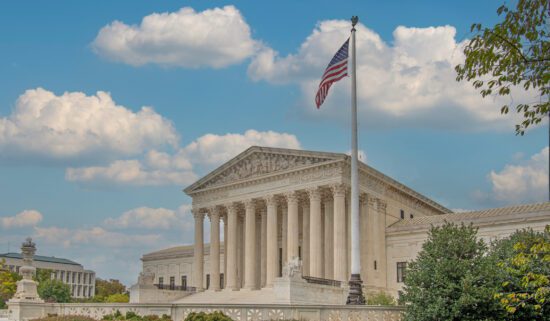Yesterday morning the front page of Hobby Lobby’s website featured a discount on a four-by-six wooden block emblazoned with the simple declaration: “I Pray for America.” Nothing on the page even indirectly mentioned the Supreme Court’s landmark decision yesterday in Burwell v Hobby Lobby, but with regard to the Green family’s vision for an America that respects religious liberty, it’s hard not to conclude that they have been praying for America and that their prayers have been answered.
I’ve followed the progress of this case with keen interest. Academic professionals who study First Amendment law are watching this case. Christians involved with closely held, religiously motivated family corporations have nervously awaited this ruling. Pastors who watch over the souls of sincere believers who try to live out the dictates of their faith in the workplace have wondered what new realities might dawn upon their flocks because of this ruling. I fit into all three of those categories, so Justice Alito today had my rapt attention.
The academic side of me is thinking about the state of religious liberty in the United States after this ruling. It may be more complicated and nuanced than you think. Four realities come to mind.
First, this is a welcome and important ruling, not only because of the relief it gives to Christians engaging in business, but also because of the disapproval it sternly communicates toward a presidential administration that is the most hostile toward religious liberty of any in our nation’s history. The decorum appropriate to the highest level of our federal judiciary precludes name-calling, but the Court’s judgment of the administration was pretty transparent when it said, “HHS’s view that RFRA can never require the Government to spend even a small amount [to pursue its interests in ways less restrictive upon religious free exercise] reflects a [low] judgment about the importance of religious liberty that was not shared by the Congress that enacted that law.” It is encouraging to see the Supreme Court’s willingness to castigate the cavalier manner in which this administration has handled questions of religious liberty.
Second, the Supreme Court has voiced its full-throated support for a holistic view of religious liberty rather than the amputated “freedom of worship” that many sectors of our nation are seeking to advance as a counterfeit of the constitutional doctrine. Religious persecution throughout history has not always consisted of imprisonments and beheadings. Both in first-century Galatia and in eighteenth-century England, governments have sometimes tried to starve believers through economic sanctions rather than to imprison them. The Court has rightly observed that “HHS would effectively exclude [devoutly pro-life] people from full participation in the economic life of the Nation” and has acknowledged that even in its economic form, religious persecution is still wrong. Religious liberty must protect a person’s right to be a Christian (or whatever else) not only on Sunday in the pew but on Monday in the office as well.
Third, religious liberty is still very fragile in our nation. If you’ll look at the Hobby Lobby decision carefully, you’ll notice that the Court ruled in favor of Hobby Lobby based not upon the First Amendment but upon the Religious Freedom Restoration Act of 1993 (RFRA) and the Religious Land Use and Institutionalized Persons Act of 2000 (RLUIPA). The Supreme Court did not affirm today any constitutional right; it affirmed a congressionally adopted provision. What Congress giveth, Congress can take away. Since this ruling and every other Supreme Court ruling based upon the RFRA exist only upon the sometimes-capricious whim of our elected legislators, in its next term, Congress could vote to overturn RFRA and Christians would be back on the same hook. Thankfully, we have reason to believe that today’s Congress would not do so, but religious liberty will not be secure in this nation until the Supreme Court’s decision in Oregon v Smith is set aside and free-exercise rights are once again protected by the First Amendment.
Fourth, although religious liberty ought to be and sometimes is a subject matter that unites conservative and liberal Christians, the Hobby Lobby case has demonstrated that this consensus tends to be a one-way street. Conservatives tend to harbor greater opposition to drug use and tend to be less disposed toward interreligious ecumenism, but more conservative groups like the Ethics & Religious Liberty Commission stand alongside left-leaning groups like Americans United for Separation of Church and State and the Baptist Joint Committee for Religious Liberty to oppose rulings like Oregon v Smith and to defend the liberties of Muslims who face opposition when they wish to build mosques. When the shoe is on the other foot—when liberal political objectives like acceptance of same-sex marriage and universal access to free abortion come into conflict with the tenets of religious liberty—liberal groups tend not to cross the aisle in our direction. The Baptist Joint Committee declined to say anything about the Hobby Lobby case, and Americans United has predictably rubber-stamped the Obama administration’s objectives, with Barry Lynn personally articulating a new mission statement advocating Separation of Church and Life. The greater sincere commitment to religious liberty is demonstrated when one is willing to part company with one’s usual cohort to take an unpopular stand.
The pastoral side of me wonders how this ruling will affect people. I rejoice to think of the people who were in jeopardy who now are not. Some beautiful, creative, redemptive things have happened throughout history when Christians have tried their hands at pursuing their secular employment to the glory of God. The Obama Administration stood poised to make that much more difficult for Christians to accomplish in this country. I rejoice that they have not succeeded. I dare to hope, in spite of the fact that the Obama Administration may very well work around this ruling to serve their allegiance to Planned Parenthood in the end, that the lives of some of the youngest and most vulnerable among us might be saved because of this decision.
This decision presents an opportunity before Christian (for want of a better word) laypeople. The Supreme Court has affirmed our right to embody our faith in our workplaces, and Christ has given us a commandment to do so. That commandment goes beyond our being selective in the way that we purchase insurance. Are we making the most of our opportunity to demonstrate the character of a holy, loving, compassionate, and merciful God in our workplaces? In 1857 Jeremiah Lanphier caught a vision for what it meant to follow Christ in the workplace. A great revival ensued. My friend Geoffrey Kolander spent several weeks last year praying, writing, and laboring for a spiritual awakening among Christian businessmen in Amarillo, TX. Two consecutive SBC presidents have prioritized the need for spiritual awakening in our nation. What would happen if more Christian businessmen followed the lead of the Green family and decided to make their faith an integral part of the way that they pursued their careers?
What would happen if we pastors used this decision not only as an opportunity to talk about religious liberty but as a way to kindle in our congregations a vision for the workplace as a venue in which to live out one’s faith?
The United States Supreme Court understood its role: “Our responsibility is to enforce RFRA as written.” As believers living and working in this society, our responsibility goes far beyond theirs. Let’s not drop the subject with a favorable judicial ruling; let’s show the world what wonderful things can happen when Christian individuals, proprietorships, partnerships, and yes, even corporations, dare to conduct their business dealings to the glory and delight of their Lord.










